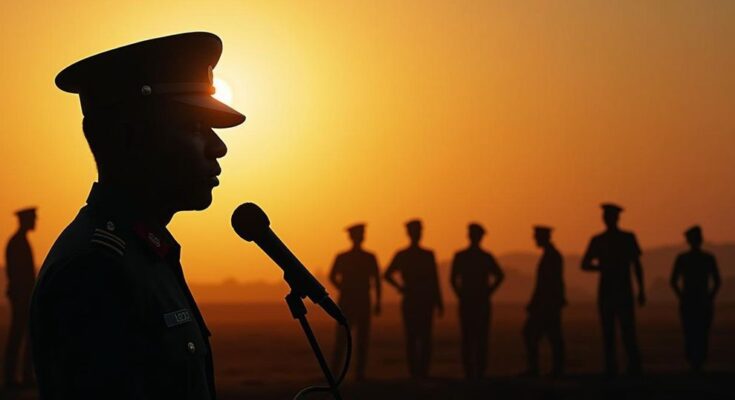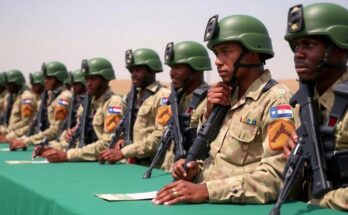General Abdel Fattah al-Burhan, head of the Sudanese army, criticized regional players in a UN speech, implicating the UAE in supporting the paramilitary RSF amidst an escalating offensive in Khartoum. He claimed external backing has prolonged the conflict, leading to humanitarian crises, and denied the level of suffering in Sudan, condemning the RSF’s actions as genocidal and criminal.
In a recent address to the United Nations General Assembly, General Abdel Fattah al-Burhan, the chief of the Sudanese army, leveled accusations against certain regional entities, implicitly targeting the United Arab Emirates (UAE), for their alleged backing of the paramilitary Rapid Support Forces (RSF). General Burhan’s remarks came amidst a substantial military operation aimed at reclaiming control of Khartoum from the RSF, who have been engaged in violent conflict with the Sudanese Armed Forces (SAF) since April of the previous year. He accused these external ‘political players’ of providing vital political and logistical support that has prolonged the conflict, stating, “If it were not for this support, which comes from states that would like to control our people’s riches through the use of force… the war would have ended.” Despite the UAE’s public denials regarding its support for the RSF, reports detail considerable backing, led by Mohammed Hamdan Dagalo, known as Hemeti. Burhan mentioned a prior phone conversation with UAE ruler Mohammed bin Zayed, in which the latter purportedly promised to reevaluate his nation’s involvement in the ongoing Sudanese turmoil. The Sudanese army has intensified its campaign against the RSF in Khartoum, with air strikes targeting significant infrastructure such as the al-Jili oil refinery. In the northern region of Darfur, the RSF’s siege on el-Fasher continues, trapping over a million civilians amidst reports of worsening humanitarian conditions, including famine in nearby camps. During his statements, Burhan condemned the RSF’s actions, categorizing them as ethnic cleansing and potential genocide, specifically criticizing their treatment of non-Arab groups and the exploitation of women and children in war zones. He asserted that the RSF’s leadership, particularly members of the Dagalo family, has operated outside the law without accountability. The prospect of diplomatic progress appears bleak, with Burhan expressing unwillingness to engage in negotiations unless the RSF withdraws its forces. He reiterated the army’s commitment to the principles from Sudan’s 2019 revolution, while stating he would not allow a return to the former regime of Omar al-Bashir.
The conflict in Sudan has entered a critical phase, with ongoing military confrontations between the Sudanese Armed Forces and the RSF, which has its roots in the notorious Janjaweed militias from the Darfur region. This conflict has exacerbated the humanitarian crisis in Sudan, displacing millions and resulting in numerous civilian casualties. The involvement of foreign nations, particularly the UAE’s alleged support for RSF, complicates the situation, drawing accusations from the Sudanese government about external manipulation of internal issues in Sudan. The current war has caused widespread suffering and has raised alarms among human rights advocates regarding the potential for further atrocities in the conflict zones.
General Abdel Fattah al-Burhan’s allegations against regional powers, particularly the UAE, underscore the complex geopolitical factors fueling the ongoing conflict in Sudan. As the Sudanese army intensifies its military efforts to reclaim Khartoum, the humanitarian crisis deepens with severe impacts on civilian populations. The stark warnings of potential ethnical abuses committed by the RSF, alongside the general’s resolute stance against negotiations under current circumstances, highlight the precarious status of peace and stability in Sudan. Without a significant change in the dynamics of support for the warring factions, the protracted violence appears set to continue, further displacing and endangering the lives of Sudanese civilians.
Original Source: www.middleeasteye.net




